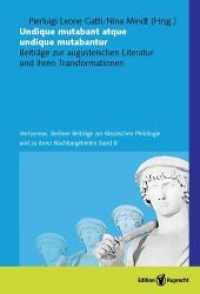- ホーム
- > 洋書
- > 英文書
- > Literature / Classics
Full Description
This is the first comprehensive analysis in any language of Herodotus' interaction with the Greek poetic tradition, including epic, lyric, and tragic poetry. It is essential reading for scholars of ancient Greek storytelling (including myth) and those interested in the hybrid nature of narrative history, as both a true or truth-based account of past events and a necessarily creative account, which requires the author to present data in a meaningful and engrossing literary form. Close readings of specific passages demonstrate how Herodotus uses the linguistic, thematic, and narrative resources of the poets to channel and challenge their social authority, and to engage the emotions and intellect of a broad Hellenic audience steeped in the traditions of poetic performance. Herodotus adopts or adapts some poetic features while rejecting others (explicitly or implicitly) as a means of defining the nature of his own research and narrative.
Contents
Introduction; 1. Poetry in Herodotus, Herodotus on poetry; 2. The prologue of the Histories and the Greek poetic tradition; Part I. Herodotus and Epic Poetry: 3. Homeric 'citations' and diction; 4. Homeric emplotment and themes; 5. Use of direct speech; 6. Modes of narration; 7. Manipulation of narrative time; 8. Truth and falsehood; 9. Historical consciousness and stratification; Part II. Herodotus and Greek Lyric Poetry: Introduction; 10. Solon's poetry and Herodotean historiography; 11. Historical narrative in non-melic poetry; 12. Herodotus and epinician poetry I: reconstructions and functions of the past; 13. Herodotus and epinician poetry II: first-person narration, tradition, and truth; Part III. Herodotus and Greek Tragic Poetry: Introduction; 14. Herodotus and Aeschylus' Persae; 15. Herodotus' use of Attic tragedy in the Lydian logos; 16. Tragic tropes in other Herodotean narratives; Conclusion: Herodotus and the poets.








